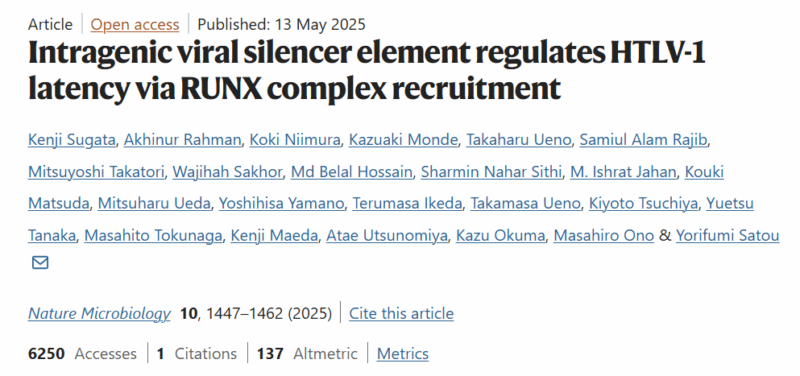
E. Shyam P. Reddy։ Understanding and Treating HTLV-1
E. Shyam P. Reddy, Professor and Director of the Cancer Biology Program at Morehouse School of Medicine, shared a post on LinkedIn:
“A research team from Kumamoto University has made a new discovery that reveals how the human T-cell leukemia virus type 1 (HTLV-1) silently persists in the body. Their finding potentially lays the foundation for new therapeutic approaches. Their study, published in Nature Microbiology, identifies a previously unknown genetic “silencer” element that keeps the virus in a dormant, undetectable state.
HTLV-1 is a cancer-causing retrovirus known to lead to adult T-cell leukemia/lymphoma (ATL), an aggressive and often fatal disease. Although most infected individuals remain asymptomatic for life, a fraction eventually develop leukemia or other inflammatory conditions. The virus achieves long-term persistence by entering a “latent” state, during which its genetic material hides inside the host’s genome with minimal activity – evading immune detection.
In this study, the research team, led by Professor Yorifumi Satou from the Joint Research Center for Human Retrovirus, Kumamoto University, identified a specific region within the HTLV-1 genome that functions as a viral silencer. This sequence recruits host transcription factors, particularly the RUNX1 complex, which suppresses the virus’s gene expression. When this silencer region was removed or mutated, the virus became more active, leading to greater immune recognition and clearance in lab models.
Remarkably, when the HTLV-1 silencer was artificially inserted into HIV-1 – the virus that causes AIDS – the HIV virus adopted a more latent-like state, with reduced replication and cell killing. This suggests that the silencer mechanism could potentially be harnessed to design better therapies for HIV as well.
‘This is the first time we’ve uncovered a built-in mechanism that allows a human leukemia virus to regulate its own invisibility. It’s a clever evolutionary tactic, and now that we understand it, we might be able to turn the tables in treatment.’ – said Professor Satou.
The findings offer hope not only for understanding and treating HTLV-1, especially in endemic regions like southwestern Japan, but also for broader retroviral infections.”
Title: Intragenic viral silencer element regulates HTLV-1 latency via RUNX complex recruitment
Journal: Nature Microbiology
Authors: Kenji Sugata, Akhinur Rahman, Koki Niimura, Kazuaki Monde, Takaharu Ueno, Samiul Alam Rajib, Mitsuyoshi Takatori, Wajihah Sakhor, Md Belal Hossain, Sharmin Nahar Sithi, M. Ishrat Jahan, Kouki Matsuda, Mitsuharu Ueda, Yoshihisa Yamano, Terumasa Ikeda, Takamasa Ueno, Kiyoto Tsuchiya, Yuetsu Tanaka, Masahito Tokunaga, Kenji Maeda, Atae Utsunomiya, Kazu Okuma, Masahiro Ono, Yorifumi Satou

More posts featuring E. Shyam P. Reddy on OncoDaily.
-
Challenging the Status Quo in Colorectal Cancer 2024
December 6-8, 2024
-
ESMO 2024 Congress
September 13-17, 2024
-
ASCO Annual Meeting
May 30 - June 4, 2024
-
Yvonne Award 2024
May 31, 2024
-
OncoThon 2024, Online
Feb. 15, 2024
-
Global Summit on War & Cancer 2023, Online
Dec. 14-16, 2023
